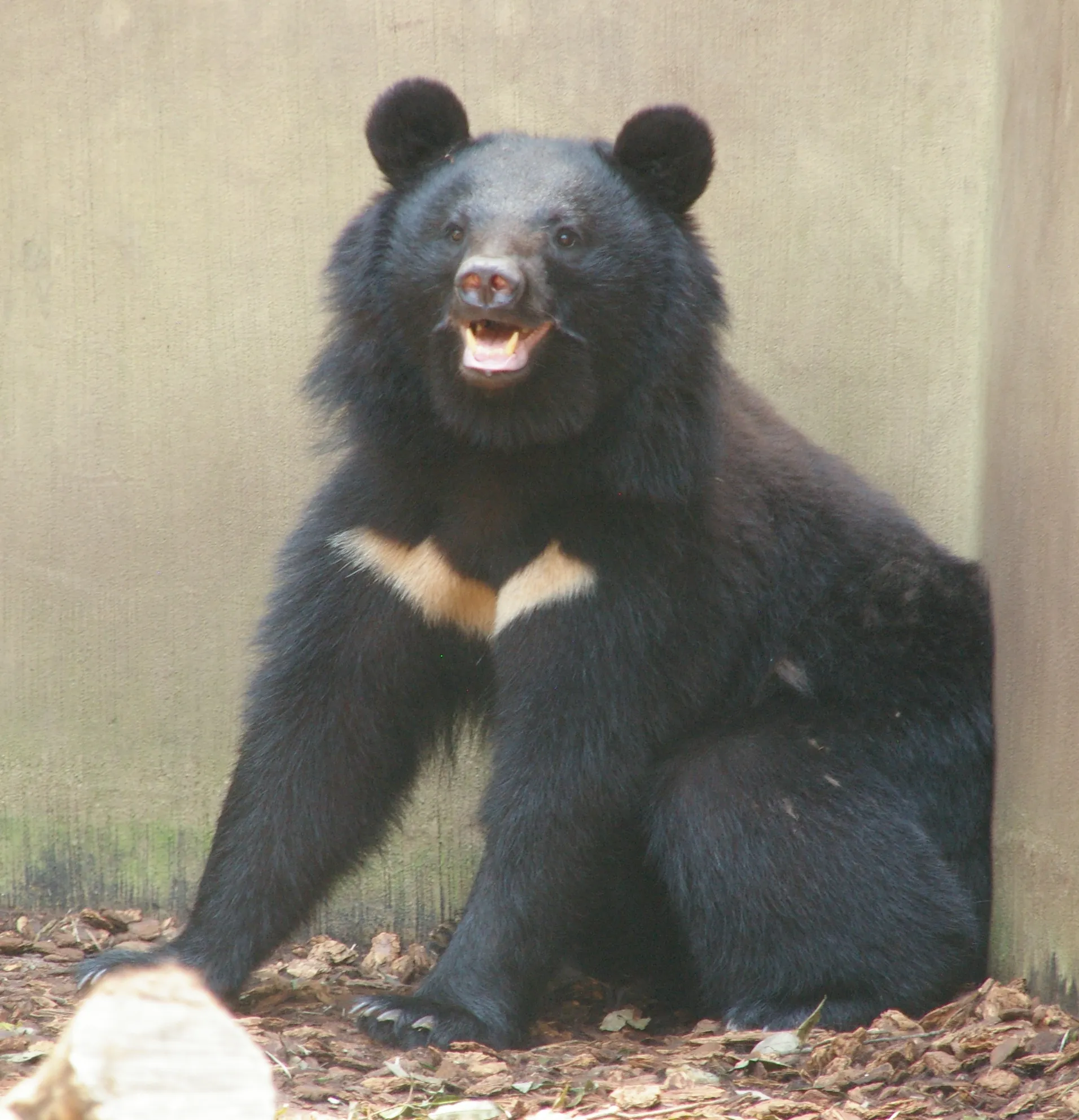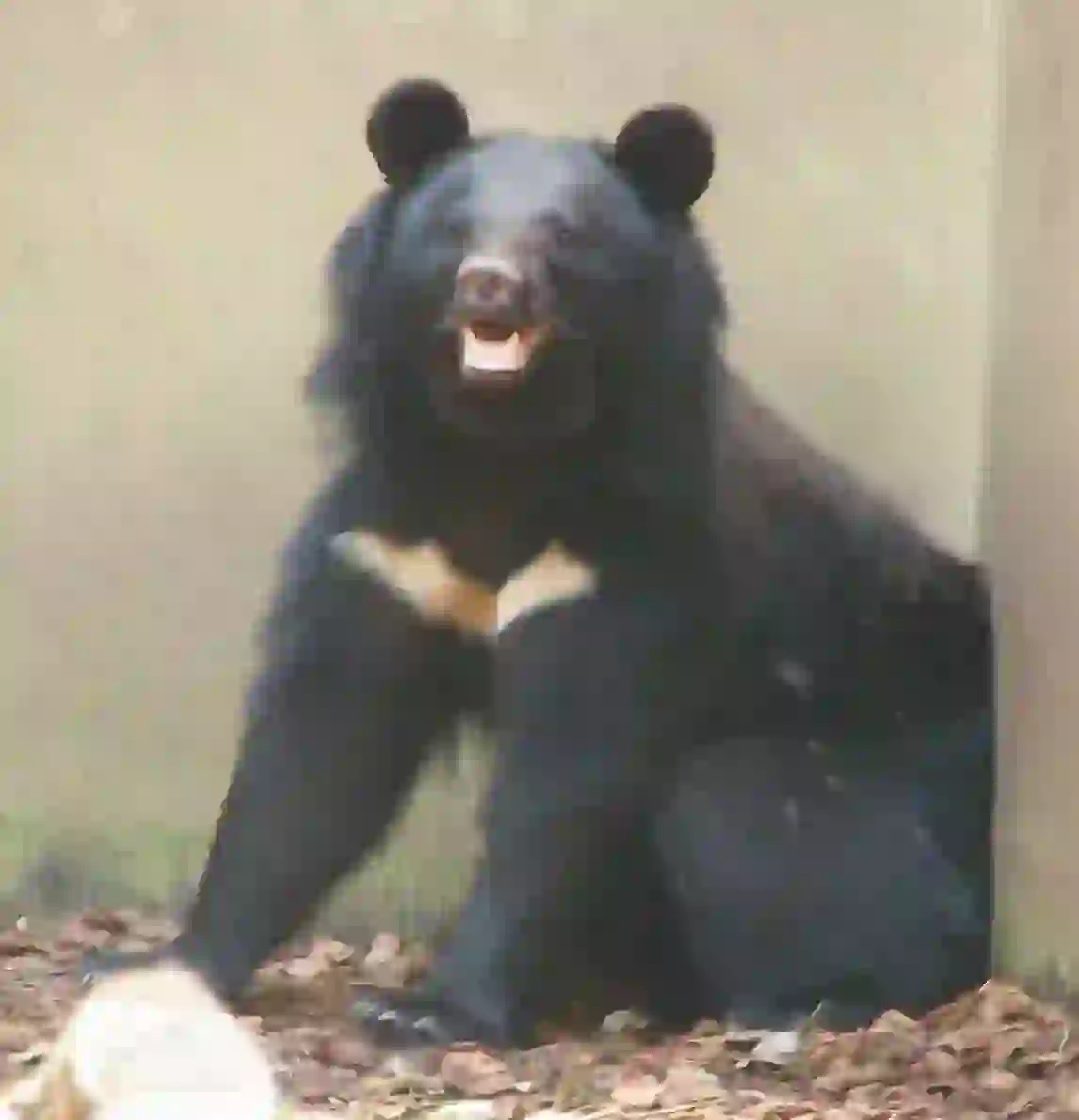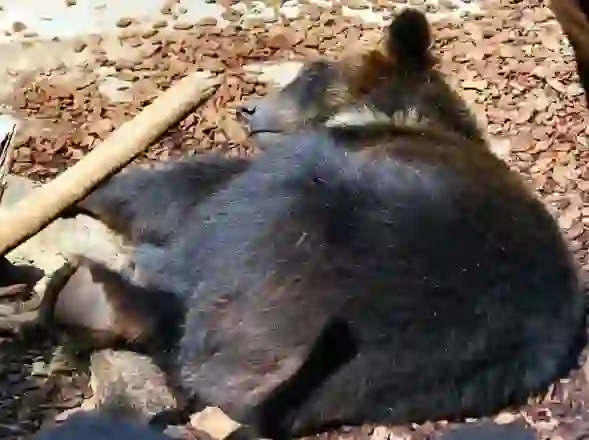
Japanese Black Bear
Japanese Black Bear
Japanese Black Bear
In the heart of Japan's deep mountains, the Japanese black bear lives a quiet life. The white crescent moon marking on their chests evokes a sense of the forest's mystique. Now facing a threat to their existence, these symbols of a rich natural heritage need our attention. Let's explore the ecology of the Japanese black bear and the efforts to protect them.
Japanese Black Bear Basic Infomation

| Property | Value |
|---|---|
| Scientific Name | Ursus thibetanus japonicus |
| Taxonomic Status | SUBSPECIES |
| Rank | SPECIES |
| Vernacular Names | Asiatic black bear, Japanese black bear |
| Kingdom | Animalia |
| Phylum | Chordata |
| Class | Mammalia |
| Order | Carnivora |
| Family | Ursidae |
| Genus | Ursus |
| Habitats | Honshu, Japan; mountainous areas, forests |
| Conservation Status | Endangered (IUCN 2023) |

Size
Their average size is 5 feet (1.5 meters), and they weigh around 132 to 265 pounds (60 to 120 kilograms). Males tend to be larger than females.

Lifespan
They are said to live for about 20 to 25 years in the wild.

Distribution
They are widely distributed on the island of Honshu, Japan. They are not found on Hokkaido. They prefer mountainous and forested areas, particularly deciduous broadleaf forests dominated by beech and Mongolian oak trees.
Japanese Black Bear Q&A

What kind of bear is the Japanese black bear?
The Japanese black bear is a subspecies of the Asian black bear and is endemic to Japan, meaning it is found nowhere else.
They are characterized by their black fur and a white crescent moon-shaped marking on their chest. This marking resembles the 'moon,' which is why they are called 'moon bears' or 'tsukinowaguma' in Japanese. In English, they are called 'Asiatic black bear' or 'Japanese black bear.' They are omnivores, eating plants, fruits, insects, and sometimes even carrion. They are skilled climbers and can be seen eating fruit or resting high up in trees. They are also known for hibernating during the winter. During hibernation, they stay in tree hollows or dens dug in the ground until spring arrives.

What do Japanese black bears eat?
Japanese black bears are omnivores and eat plants, fruits, insects, and sometimes even carrion.
Their diet varies with the seasons. In spring, they wake up from hibernation and eat a lot to regain the strength they lost during the winter. They mainly eat young leaves, buds, and insects during this season. Summer brings an abundance of fruits and nuts, which become the center of their diet. In autumn, they eat a lot of acorns and chestnuts to prepare for hibernation. Acorns and chestnuts are highly nutritious and ideal for storing fat. They do not eat anything during their winter hibernation.

Why are Japanese black bears endangered?
The Japanese black bear is listed as 'Vulnerable' on the IUCN (International Union for Conservation of Nature) Red List.
This means that they are at high risk of extinction in the near future. There are three main reasons for their decline:
- Habitat loss: Deforestation due to logging and road construction is destroying their forest habitat.
- Poaching: Their gallbladders are highly valued as an ingredient in traditional Asian medicine, making them targets for poachers.
- Human-wildlife conflict: As humans venture into the forest for activities like gathering wild vegetables and mushrooms, encounters with bears have increased. This has led to incidents of bears attacking humans and, conversely, humans killing bears.
To protect Japanese black bears, it is crucial to protect their forest habitat, prevent poaching, and reduce human-wildlife conflict.

[Quiz!] What is hibernation like for Japanese black bears?
Japanese black bears hibernate during the winter.
During hibernation, they sleep in tree hollows or dens dug in the ground until spring. They lower their body temperature and heart rate during hibernation, conserving energy. They also eat a lot and store fat before hibernation, which serves as their energy source during the winter. They typically emerge from hibernation around April. Upon waking up, they immediately start looking for food.

[Quiz!] Are Japanese black bears good at climbing trees?
Yes, Japanese black bears are excellent climbers!
They use their sharp claws to skillfully climb trees. Climbing trees helps them access fruits and provides a safe haven from predators. They also like to rest in trees. Being high up in a tree offers them a sense of security.

[Quiz!] What can we do to protect Japanese black bears?
There are many things we can do to protect Japanese black bears.
- Take your garbage home with you: Leaving garbage in the mountains can attract bears, leading them closer to human settlements. Always take your garbage home with you.
- Report bear sightings to the relevant authorities: If you see a bear, immediately contact your local municipality or the police.
- Carry bear bells or a radio when entering the mountains: Making noise with bear bells or a radio can alert bears to your presence, reducing the chances of a surprise encounter.
- Avoid approaching bear habitats: Do not venture into bear habitats unnecessarily. Early mornings and evenings are when bears are most active, so be extra cautious during those times.
- Support bear conservation efforts: Conservation organizations like WWF Japan are working to protect Japanese black bears. You can support their efforts by donating or volunteering.
Japanese black bears are a symbol of Japan's rich natural environment. Let's each consider what we can do to protect their future and take action!

Would you like to become a part of the 'Animalbook.jp'?
Turn your knowledge into Q&A and share it with the world. ※Publication will be activated after purchase. Let's share information together!
Japanese Black Bear Type of List

Subspecies of the Asian Black Bear
- Himalayan black bear (Ursus thibetanus thibetanus)
- Sichuan black bear (Ursus thibetanus mupinensis)
- Formosan black bear (Ursus thibetanus formosanus)
- Ussuri black bear (Ursus thibetanus ussuricus)
Information
Congratulations! You are the first commenter!

Create Your Favorite List!
Japanese Black Bear
Save the animals you love! Build your own list to quickly revisit your favorites later.

Would you like to leave a comment?
※Please note: This is for the purchase of rights to post comments within the article.
Find Your Favorites!
Our shop offers a unique and attractive selection of goods themed around various animals.
Japanese Black Bear References
Japanese Black Bear Introduction of media used

LUNA-drops, CC BY 3.0, via Wikimedia Commons

Help Enrich Our Animalbook.jp with Your Media!
We are constantly looking to expand and enrich our Animalbook.jp with amazing photos and videos of animals. If you have any media that you'd like to share, please contribute and help us showcase the beauty and diversity of the animal kingdom. Your submissions will be credited and featured in our encyclopedia, reaching a wide audience of animal lovers.


















